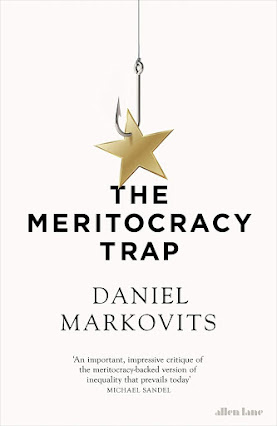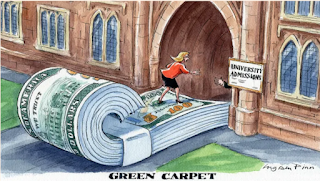Literature Review #3

Markovits, Daniel. The Meritocracy Trap: How America's Foundational Myth Feeds Inequality, Dismantles the Middle Class, and Devours the Elite. Penguin Books, 2019.
Summary
In this book, Daniel Markovits argues that meritocracy underwrites deserved advantage by purporting to ensure that social and economic rewards track achievement rather than breeding. Meritocracy produces a new form of hierarchy as rich parents invest heavily in education, creating a meritocratic inheritance that guarantees entrance to elite colleges and then for elite jobs. Meritocratic training and meritocratic jobs are connected through feedback loops. The elaborate education trains the meritocrats to possess exceptional skills and a huge capacity for work, shaping them into a superordinate working class. As new technologies are constantly being invented to suit elite labor force, the labor of the middle class becomes redundant and hence deemed worthless. Markovits criticizes how the elite class are operating as rentiers of their own human capital to keep their status and income intact.
Author
Daniel Markovits is the Guido Calabresi Professor of Law at the Yale Law School, and the Founding Director of the Yale Centre for the Study of Private Law. He works in the philosophical foundations of private law, moral and political philosophy, and behavioral economics. Having spent his life at elite universities, Markovits is knowledgable about the dark side of meritocracy. He provides rich analysis of how the elite class, who seemingly benefits the most from meritocracy, are made miserable with his first-hand experience of teaching students at Yale.
Key words
- Superordinate working class: The rich elites who work harder, longer, and perform more high-skilled work. Markovits argues that the extravagant incomes that superordinate workers make is not due to their “extraordinary effort” but rather the “economic value” of the “human capital” (36).
- Snowball inequality: An amplified meritocratic inequality through a series of feedback loops. Markovits suggests that elaborate educational training and enormous incomes sustained by the elite workers are the two basic building blocks of the snowball inequality.
Quotes
The meritocratic trap imprisons the imagination, casting economic exclusion as an individual failure to measure up and blocking the middle class from collective consciousness of the harms that meritocracy imposes. Meritocracy remakes the middle class as a lumpenproletariat (Markovits 30).
The elite, acting now as rentiers of their own human capital, exploit themselves, becoming not just victims but also agents of their own alienation. […] Where physical and financial capital frees its owner from the pressures to satisfy others, human capital focuses and concentrates all of these pressures insistently on the person who owns it (Markovits 40-41).
Critics variously call elite students ‘very smart’ but ‘completely confused’ with ‘no idea what to do next,’ ‘zombies,’ or, in perhaps the most memorable phrase in the genre, ‘excellent sheep.’ When a group of elite professional school students was recently asked who among them would be willing to spend fifteen hours per week on an intrinsically worthless task in order to gain a career advantage, all said that they would and, moreover, expressed surprise at the question (Markovits 154).
Value
Markovits discusses meritocracy not only with respect to college admissions but also career. The argument that technological inventions are transforming the labor market to increase social and economic returns to the elite class was really incisive. It is interesting how the meritocratic inequality in education feeds into meritocratic inequality in the workforce, which enables the so-called “superordinate” workers to buy even more unequal education for their children, generating a cycle of inequality.

Comments
Post a Comment